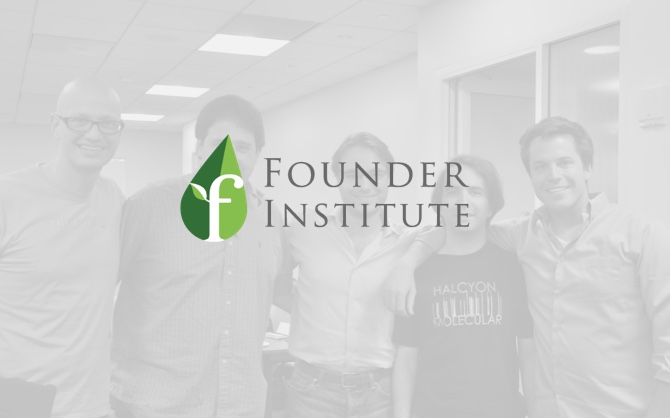
We talk a lot about pitching here at the Founder Institute, between our entrepreneur training program and our pitching event the Founder Showcase. This is because no matter what type of business you are trying to create, you will need to pitch it thousands of times to potential customers, employees, investors, press, and more. Yeah, pitching is pretty damn important.
At this week's Launch Festival in San Francisco, we were able to see some some truly amazing startups pitch to the over 11,000 people in attendance. And, while the goal of almost all the pitches was to attract investors, watching the competition can also be incredibly informative for aspiring entrepreneurs looking to refine their own pitch. It is basically one long, expert pitch clinic.
Countless members of the Founder Institute global network were in attendance, but I'm going to highlight our three family members who presented onstage and outline some of the main lessons learned.
One Drop (winner of the "Best Design Award")
One Drop is a diabetes management platform that helps people navigate diabetes together. It was founded by Jeffrey Dachis, Co-Founder of Razorfish, and long time Founder Institute Mentor.
Jeff delivers what we like to call a "pain point pitch", where he clearly communicates the "why" of the company, and outlines the important problem it is trying to solve.
But, I think the most important thing you can learn from this pitch is how to deliver a strong ending.
Jeff starts the pitch by outlining a fictional customer ("Joanna"), who blacks out in an elevator and nearly loses her life. Then, after showing you the beautiful product and listing its benefits for all the stakeholders in the healthcare industry, Jeff finishes the last 20 seconds of the pitch by dropping three "haymakers" for an incredibly impactful conclusion;
- "The product is Apple Watch-ready"
- "Oh yeah, and it's FREE" (this got a rousing applause from the audience)
- "I'm Jeff Dachis. But I'm also 'Joanna'. I blacked out in the elevator, I busted up my face, and I'm asking you to join me in a healthcare revolution..."
Due in large part to the ending, Adeo Ressi (Founder & CEO of the Founder Institute), called it "one of the best pitches I have ever seen".
Fountain (winner of the "2.0 Award")
Fountain is an app that helps you solve any problem in and around your home by connecting you to an expert over video chat in about 90 seconds. It was co-founded by Aaron Patzer, Founder of Mint.com, and longtime Founder Institute Mentor.
Aaron delivers what we call a "product-focused pitch", and he does it flawlessly through a live onstage demo unlike one you've probably ever seen. No mentions of market size, competitors, or hockey-stick projections here - just awesome product.
In fact, during Aaron's live pitch, his Co-Founder was on stage guiding the live demo, following up each of Aaron's sentences with a demo of the product in action. They call a "helper" (showing the app's speech analysis skills in action), and even brought a small planter on stage to demonstrate the interactive features of the app (like screensharing, photosharing, text chat, and more). Upon the conclusion of the live demo, the crowd applauded as well.
What can you learn from this pitch? In short, "show, don't tell".
RushTix
RushTix is a monthly subscription service for unlimited local arts and culture events. It was founded by Jill Bourque, a Graduate of the Silicon Valley Founder Institute.
Jill delivers a more traditional, "narrative" pitch, where she tells a clear story and frames the service in a way that anybody can understand. She starts by addressing the market size, and then describing how the company tested and built the solution through over 500 events and 300 paying customers. Then she guides you through the product features, outlines her differentiation ("curation"), and announces the official launch.
The pitch is incredibly clear, so at no point in her pitch are you confused or asking questions (which allows you to focus on the business instead).
However, other than the clear narrative, there is an even more important takeaway from her pitch for all entrepreneurs to understand.
She answers the "why you?" question in her pitch.
At the conclusion, Jill brings the pitch back to her, showing the audience why she is the right person to execute this business with her 15 years of experience as a theater producer and performer.
For more tips on startup pitching, check out the Founder Institute's Favorite Startup Pitch Resources.
So, what do you think of these pitches? Let us know in the comments below..



